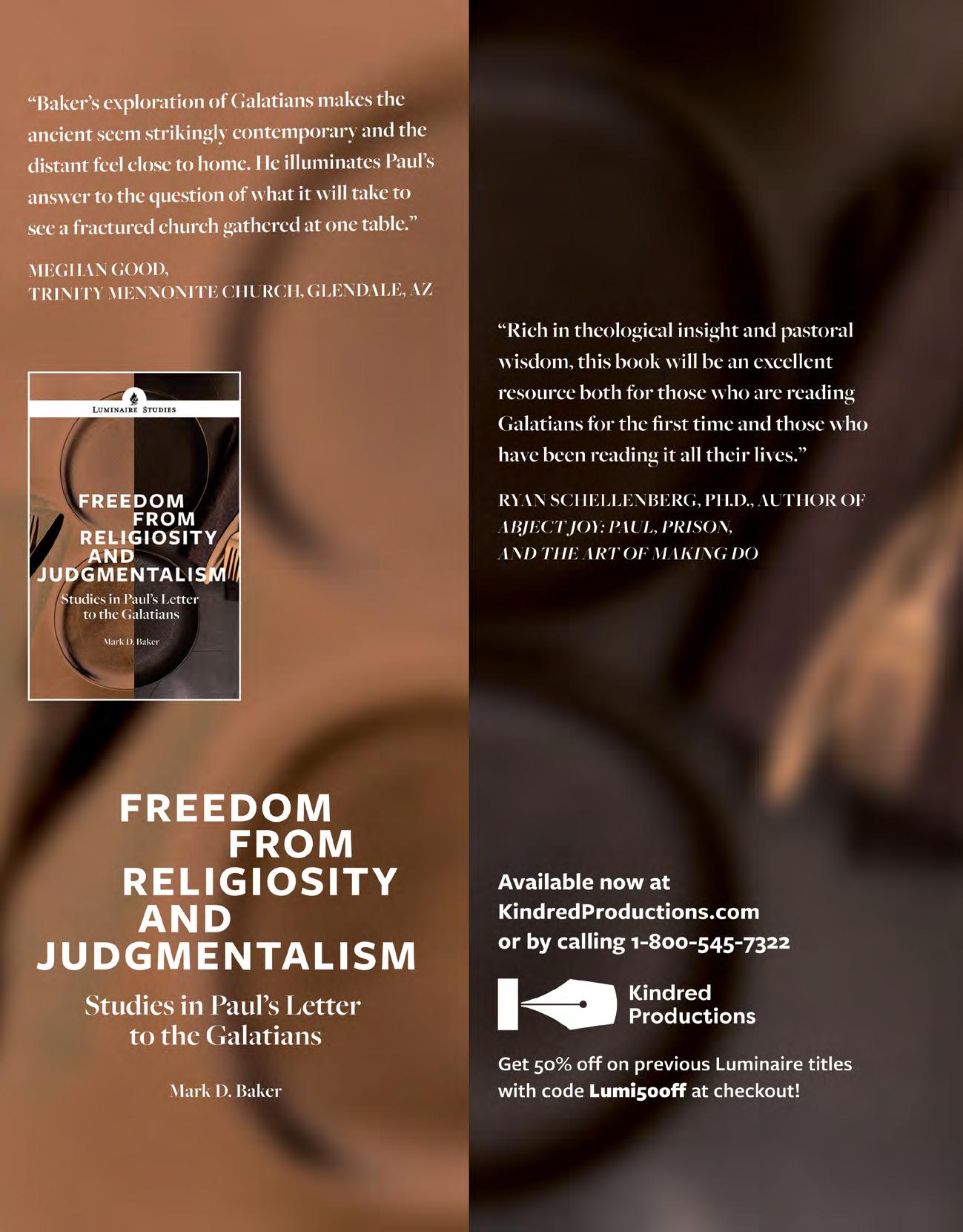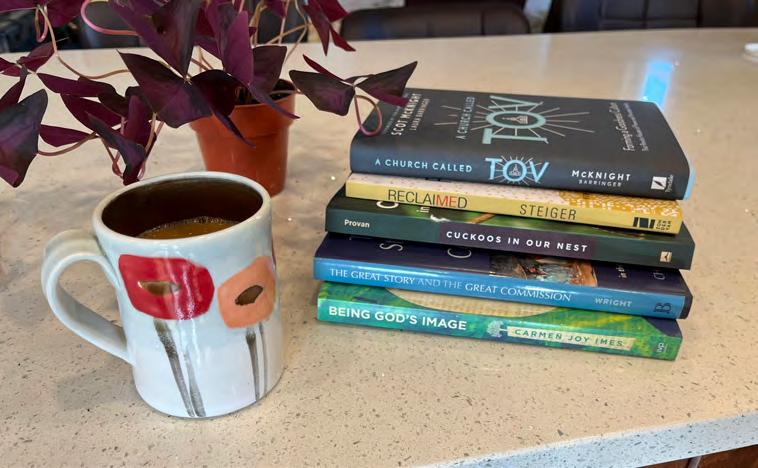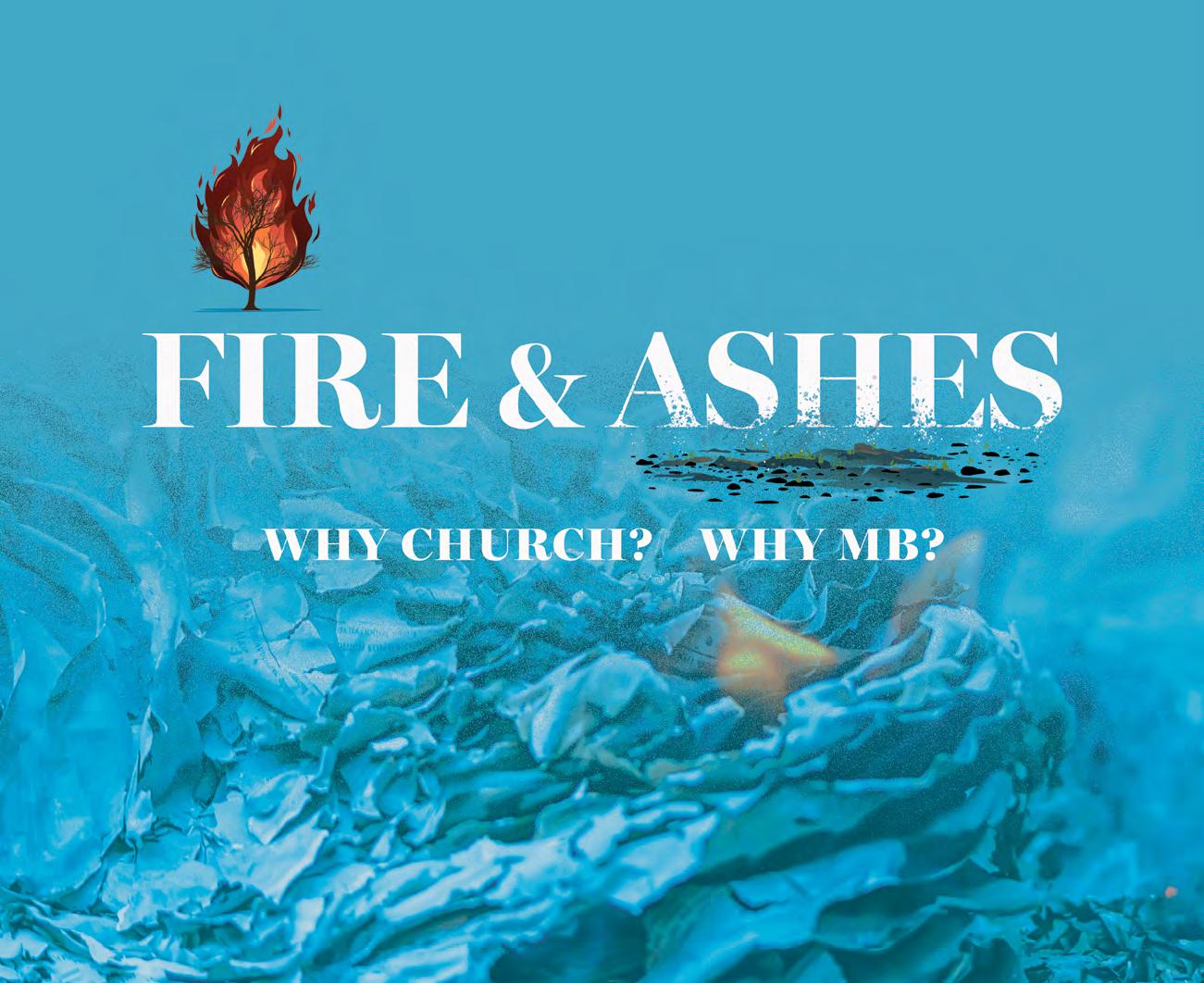VOLUME 62, NO. 9
COLUMBIA BIBLE COLLEGE APPOINTS ACTING PRESIDENT
HOLY SPIRIT—FILL US WITH YOUR GENTLENESS

JENEH PARK: FINDING A NEW COUNTRY AND A NEW FAITH
SEPTEMBER 2023
MBHERALD.COM
More than sixty years of sharing the life & story of the Mennonite Brethren in Canada
Digest

Mennonite Brethren Herald Digest is digitally published monthly by the Canadian Conference of Mennonite Brethren Churches, primarily for the use of its members, to build a Canadian MB community of faith. We seek to 1) share the life and story of the church by nurturing relationships among members and engaging in dialogue and reflection; 2) teach and equip for ministry by reflecting MB theology, values, and heritage, and by sharing the good news; 3) enable communication by serving conference ministries and informing our members about the church and the world. However, the opinions expressed here are not necessarily those of the church as a whole.
SEPTEMBER, 2023 | VOLUME 62, NO. 9
EDITORIAL OFFICE
1310 Taylor Avenue
Winnipeg, Manitoba R3M 3Z6
Phone: 204-669-6575
Toll-free in Canada: 888-669-6575
MBHERALD@MBCHURCHES.CA
WWW.MBHERALD.COM
ISSN: 0025-9349
“It’s not the gender that qualifies someone to serve in the church." For Jenah Park, leadership is something that God uniquely shapes in a believer, and then calls them to. It is precisely this calling and shaping by God that qualifies you to lead.

Read our profile on Jenah on page 10.
The Mennonite Brethren Herald is a publication of 4 10 18
1 MENNONITE BRETHREN HERALD SEPTEMBER 2023
Digest
12 HOLY SPIRIT—FILL US WITH YOUR GENTLENESS Danielle Lajeunesse
EQUIP 2023:A PREVIEW CCMBC Staff
TWITTER.COM/MB_HERALD
MBHERALD.COM Connect
Q&R CORNER Ken Esau FINDING A NEW COUNTRY AND A NEW FAITH Karen Esau FACEBOOK.COM/MBHERALD
SOUNDCLOUD.COM/MBHERALD
Sharing the life and story of Mennonite Brethren in Canada
CANADIAN CONFERENCE OF MENNONITE BRETHREN CHURCHES
CONFÉRENCE CANADIENNE DES ÉGLISES DES FRÈRES MENNONITES
From the editor
COME TOGETHER
We are just a few weeks away from EQUIP 2023, and the excitement around the office has been building up for months. It's hard to believe that it's almost here. You may have noticed that we didn't call it a "study conference," which we'd been calling for over a decade. We did this intentionally because EQUIP is more than a study conference. Some of you may remember attending "Gathering," which was CCMBC's annual general meeting of churches. Gathering used to be a destination point for MBs nationwide; some would even plan their summer vacations around the event. We see EQUIP as the new Gathering, and we hope it will become a cherished event in the hearts (and calendars) of MBs for many years to come.
From now on, one major change we are making to EQUIP is the inclusion of the National Assembly (our AGM, for those who may not know). After the last plenary session on Saturday morning, we will meet as a family to discuss the future of our denomination, particularly in the areas of mission and leadership development. We will also ask delegates to approve the 2024 budget.
Can you believe it's been four years since the national conference of churches has gathered in person? The last occasion was EQUIP 2019 in Waterloo, Ontario. Had we known back then what we would face in the years that followed, how might we have used that time differently? What might we have said to each other? How might we have expressed our love and appreciation? There'd be hugs, lots of hugs, I bet.
But here we are, many years removed. We are not the same people we were in 2019; we are not the same conference of churches. We have faced numerous challenges that have affected us deeply. Our identity has been wounded, our relationships have been strained, and some have even been severed. Additionally, our theology has been called into question. Add to that a remaining hesitancy to physically be together. We've put hugging on hold.
Visit equip.mennonitebrethren.ca to register, and for an overview of speakers, topics, suggested readings and more.
EQUIP and National Assembly are one event, but Saturday's business component requires separate National Assembly registration via delegates' churches. Please speak to your pastor or contact us at communications@mbchurches.ca for more assistance.
Visit na.mennonitebrethren.ca for information on National Assembly.
EQUIP 2023 is asking big questions: Why Church? Why MB? Seriously, who are we, and why do we exist? We've tackled the identity question before, but now, more than ever, we must come together to wrap our hearts and minds around it as we face a very different world.
We hope you are as excited as we are about gathering together, reconnecting with friends we have been missing, and meeting new people who may become friends. We have tried to make this affordable for our family across the country by lowering registration costs and offering specially subsidized rates for all registrants under 30 years of age and for all spouses of pastors. But these rates go up after September 30, so register today and encourage others you know to do the same. EQUIP 2023 is not just for pastors or leaders but for all "those who call the MB church their home." Join us in Abbotsford, October 26-28! You'll be glad you did.
Carson CARSON SAMSON Communications director

2 MBHERALD.COM SEPTEMBER 2023
COLUMBIA BIBLE COLLEGE APPOINTS ACTING PRESIDENT

The Columbia Bible College Board of Directors is pleased to announce that Derek Rogusky, current Chief Financial Officer of Columbia, has accepted the role of Acting President effective Wednesday, August 16th. The appointment as Acting President is until July 31, 2024 or until a new president is confirmed.
In announcing Derek’s appointment, John Best, CBC’s Board Chair, said, “the Board is confident that Derek and the Transitional Leadership Team will continue to move CBC forward in exciting new ways, even while we search for a new long-term president.”
In collaboration with the Board, Derek will lead the College’s Transitional Leadership Team focusing on the following key priorities this coming year:
1. Deepening CBC’s efforts to disciple young people to become deeply rooted followers of Jesus and prepare them for a life of faithful service inside our churches and beyond.

2. Renewing CBC’s programming to better focus on our mission and partner with like-minded churches and ministries.


3. Improving student recruitment and communication with CBC’s stakeholders
4. Developing a more agile organization.

To read the full announcement from the Board of Directors at Columbia Bible College, as well as Derek’s bio, please visit columbiabc.edu/actingpresident

Need help subscribing to the online digest? Email us at mbherald@ mbchurches.ca, or call 1-888-669-6575 and ask for Carson or Liam. 3 MENNONITE BRETHREN HERALD SEPTEMBER 2023
Give gifts that change lives multiply.net/gifts together that the world may know Jesus
Q&R corner
Q&R corner provides responses to questions that readers may have about CCMBC and its work collaborating with provincial MB conferences in areas of spiritual health and theology, leadership development, mission, and organizational health in order to achieve the overall mission: “To cultivate a community and culture of healthy disciple-making churches and ministries, faithfully joining Jesus in his mission.” If you would like to contribute a question, please send it to questions@mbchurches.ca
Please note that we will not be using your name in the MB Herald Digest in order to respect those who prefer anonymity. There may not be space to respond to every question—and sometimes we might not really have the ability or authority to respond to some questions (for example, those that relate more directly to one of our provincial MB conferences or to a local church leadership). We apologize in advance if we are unable to publish a response to your specific question.
DOES A TRANS-MALE INVOLVED IN AN INTIMATE COMMITTED MARRIED RELATIONSHIP WITH A CIS-FEMALE ALIGN WITH OUR MENNONITE BRETHREN BIBLICAL ETHIC?
M.
Thanks, M., for this question that I know is being asked by some within our national family.
As you are likely aware, a lot of time is needed today to make sure that we are understanding words the same way. So I must spend a few moments explaining my definition of terms and how I’m understanding your question and the terms you are using. (If I have misunderstood your intention, please let me know.)
I will begin with my definition of “birth sex.” This is normally understood as the physical genitalia characteristics of a child at birth that identifies the child as either a boy or a girl. While the exact definition of all the conditions that should be included under the umbrella term “intersex” is debated, “ambiguous genitalia affect 1 in 5,000 live births” (https://www.ncbi. nlm.nih.gov/pmc/articles/PMC7845444/ ). As a result, birth sex as boy or girl is clearly recognizable in over 99.9% of live births. While many would prefer not to use the term “birth sex” but rather the expression “sex assigned at birth,” it seems that birth sex (boy/girl) is
an external physical and observable reality—not something that medical professionals need to construct and assign. The question of gender expression and gender identity is related but separate. It is also beyond what we can cover here.
Here are my understandings of the words you have used in your question:
“trans-male”—A person born with a birth sex of girl/female who now identifies as a male/man (their gender identity). This individual may or may not have taken steps to align their physical body with their male gender identity.
“cis-female”—A person born with birth sex of girl/ female and sees themselves as a female/woman. (The “cis” prefix here implies that there are objectively [at least] two types of women and men—cis and trans. While these categories obviously exist in society as people identify in these ways, there is much dispute whether a person born as a girl/woman could objectively become a “man” by means of identifying as a man and possibly taking part in body altering measures.)
4 MBHERALD.COM SEPTEMBER 2023
“intimate committed married relationship”—A covenantal relationship that involves relational and sexual intimacy.
“biblical ethic”— A biblical ethic is for those who desire to worship Jesus, follow Jesus, and seek first God’s Kingdom. A biblical ethic is first of all a summary of what the Bible describes about what loving God looks like. If someone does not absolutely want to love God, then a biblical ethic will be both nonsensical and undesirable. A biblical ethic secondly describes God’s perspective on love for neighbour (and love for self).
A biblical ethic is, therefore, fundamentally a “love ethic” rooted in one’s love for God and demonstrated through a God-centred love for neighbour (and self). We should constantly think of this when we use the expression “biblical ethic” which can sound sort of cold and legalistic. It is really a “biblical love of God and neighbour ethic.”
While we might have many ideas about what loving God and loving neighbour should look like, we are trusting God’s voice through the Bible to guide us, correct us, and empower us on that journey.
A biblical ethic is discerned in a multitude of overlapping ways. God’s overarching Kingdom story from Genesis 1 to Revelation 22 provides the foundational contours for that ethic. We must ask whether certain behaviors are consistent with God’s biblical redemption story which displays God’s character, God’s vision for all creation, and God’s mission that finds its fulfillment with the ultimate return of Jesus. (I have expressed this elsewhere as asking whether the behavior is consistent with the “Shalom Kingdom melody” that God is singing throughout the story that the Bible tells.) There may also be specific biblical texts and biblical teaching addressing the ethical questions we are asking about so a biblical ethic must interact with them. Finally the biblical story can be brought together into key themes like creation, humanity, sin, salvation, marriage, and so on—and these key themes have profound implications for how disciples of Jesus should live.
A biblical ethic that loves God and neighbour does not necessarily produce obviously positive results in the lives of those who follow that ethic. A biblical love ethic does not promise increased happiness or the end of pain and suffering for Christians living faithfully in our broken world. Living in alignment with a biblical ethic may lessen pain and produce joy (Acts 13:52; Romans 14:17), but it may also create more pain (Romans 8:18). But for disciples of Jesus, pain may well be part of developing the character of Jesus (Romans 5:3-5; James 1:2-4) as we share in the sufferings of Christ (Philippians 3:10; 1 Peter 4:12-16).
“Mennonite Brethren biblical ethic”— Our MB Confession of Faith “expresses what [MBs] believe the Bible teaches regarding our core theological and
A biblical ethic is, fundamentally, a “love ethic” rooted in one’s love for God and demonstrated through a God-centred love for neighbour (and self). We should constantly think of this when we use the expression “biblical ethic” which can sound sort of cold and legalistic. It is really a “biblical love of God and neighbour ethic.”
ethical convictions” (“Introduction to the MB Confession of Faith [2023]”). This means that our MB Confession of Faith seeks to express our understanding of a biblical ethic for disciples of Jesus and the Church today. Our Confession describes what we think loving God and neighbour looks like. With this in mind, it should be clear that our MB Confession of Faith is not designed to tell non-Christians how they should or should not live. Unless someone repents, bows down, is reconciled to God in Christ, and wants to truly love God and neighbour, these 18 articles will be more like the aroma of death than life (cf. 1 Corinthians 2:15-17).
Our biblical ethic related to marriage is articulated in Article 11. Here is the most relevant paragraph:
Marriage
Marriage is a covenant relationship intended to unite a man and a woman for life. At creation, God designed marriage for companionship, sexual union, and the birth and nurture of children. Sexual intimacy rightfully takes place only within marriage. Marriage is to be characterized by mutual love, faithfulness, and submission. A believer should not marry an unbeliever.
SPIRITUAL HEALTH AND THEOLOGY 5 MENNONITE BRETHREN HERALD SEPTEMBER 2023
“ ”
When it comes to interpreting the words recorded in the MB Confession of Faith (1999), it seems clear that the “man and a woman” here should be understood in light of the Bible references about God’s creation of humans as “male and female” listed at the end of the article (viz. Genesis 1:26-31; 2:18-24; Matthew 19:3-12). Article 2 in our Confession supports this definition as well: “God created them male and female in the image of God” (Genesis 1:27; 5:2). Jesus quotes Genesis in Matthew 19:4 and Mark 10:6 in support of covenantal marriage. Is there any reasonable possibility that the biblical writers (and Jesus specifically in his pronouncements in Matthew 19 and Mark 10) would look at our modern situation of trans-identity and declare a person as a “male/man” if they had been born with a birth sex of female?
The biblical view of the human person does not describe a person as having separate distinct parts (viz. body, mind, soul, spirit) but as one unified whole of body, mind, soul, and spirit. (The only time that a person is a separated entity is temporarily between the time of physical death and the time of bodily resurrection when Jesus returns. Unfortunately, many Christians over the centuries have embraced an unbiblical anthropology highlighting the eternal value of the human soul and the temporary and therefore disposable value of the human body.)
What this unified human person means practically is that separating one part of a person and giving it the status of “truth” and another part of a person as speaking “untruth” is not consistent with a biblical anthropology. The Bible implies that humans are unified beings—in both sin and redemption.
To answer your question simply and directly, I do not believe that a biblical ethic (and the MB Confession of Faith that is built on that biblical ethic) would affirm that the scenario you suggested (or the various other permutations possible) is in line with how we believe God has revealed to us what loving God and neighbour looks like. As a result, according to our understanding of the biblical ethic, this ethical choice will not ultimately lead to fullness
The biblical view of the human person does not describe a person as having separate distinct parts (viz. body, mind, soul, spirit) but as one unified whole of body, mind, soul, and spirit.
of life, flourishing, and faithful worship of God. And as far as I am aware, there is no CCMBC recommendation or resolution since 1999 that leads me to believe that this assessment has been renounced or revised.
But—some argue that compassion/love (which is understood as prioritizing the reduction of suffering and potential self-harm) and fairness/justice (which is often defined as equality of access to happiness) must override biblical ethics when that ethic seems to, in their eyes, lack compassion and fairness. The argument is that Christian ethical wisdom should involve being guided by these “higher” values when we perceive that the biblical ethic does not meet this standard. I have heard people say almost exactly this—”I don’t care about what the Bible says or what the MB Confession of Faith says, I just want to love my son [or daughter or_____________].”
If we decide that our biblical ethic presently understood is not fundamentally compassionate, loving, fair, and just, we will want to look again to confirm that it is truly faithful to Scripture. But ignoring a biblical ethic in favour of our own ethical wisdom and its definitions of love and justice is a profound church-altering move away from how orthodox Christians over the centuries have understood God’s discipleship path. Let’s think and pray very carefully before we take that giant step. (For my evaluation of a book that argues for a move to “wisdom,” see here.)
While the National Faith and Life Team has not produced a specifically MB resource related to these questions of gender identity and its relation to birth sex, I believe the following resource is helpful. See Dr. Preston Sprinkle, “A Biblical Conversation About Transgender Identities” (Download here).
Thanks again, M., for your question.
Ken Esau National Faith & Life Director
6 MBHERALD.COM SEPTEMBER 2023 SPIRITUAL HEALTH AND THEOLOGY
“ ”




7 MENNONITE BRETHREN HERALD SEPTEMBER 2023 NATIONAL ASSEMBLY CANADIAN CONFERENCE OF MENNONITE BRETHREN CHURCHES CONFÉRENCE CANADIENNE DES ÉGLISES DES FRÈRES MENNONITES October 28, 2023 | Click to register
Make an ongoing difference in ministry through your investment

Benefitting your financial future and the future of the Church
Your financial investment in the MB Conference continues to facilitate ministry growth in practical and profound ways. Your investment helps provide mortgages to MB churches and pastors that may otherwise be unavailable. This enables churches and pastors to have a presence in the communities they serve.
Income generated by CCMBC Investments is directed to ministry to help grow God’s Kingdom by supporting activities such as church planting, pastor leadership training and other church-led ministry efforts.
1-888-669-6575
ccmbclegacyfund.com 1-855-437-7103
Contact CCMBC Investments or Capstone Asset Management to learn more or to make an investment in a Cash Account, RRSP or TFSA. INVESTING IN KINGDOM GROWTH TOGETHER
legacy@mbchurches.ca
ccmbc@capstoneassets.ca
CCMBC Investments Ltd makes change to investment program
Effective September 1, 2023, the Board has discretion to set interest rates.
[WINNIPEG, MANITOBA, September 12, 2023] – Effective September 1, 2023, the Board of Directors for CCMBC Investments Ltd., the entity responsible for the CCMBC investment program, has full discretion in setting the interest rate paid to investors, returning to the process in place from inception of the investment program until 2019.
The investment program, which has been running since 1980, reorganized its structure on August 30, 2019. Some structural changes were made while maintaining the program's core attributes. One of those changes was the way CCMBC Investments Ltd. sets interest rates. As part of the reorganization it was determined at the time that interest rates paid to investors on the promissory notes held by them would be determined using a formula directly tied to the Bank of Canada (BOC) overnight lending rate as more fully described in the current Offering Memorandum. The COVID-19 pandemic and subsequent rapid increase of interest rates in 2022 exposed limitations to this model of interest rate determination. When the BOC rates were very low, the interest rates resulting from the foregoing formula were not high enough to attract new investments. So, amendments were made to the Terms and Conditions of Notes, which governs the promissory notes held by investors, to authorize the Board to pay a higher interest than was allowed prior to such amendments. As the BOC rate rapidly increased, the rate CCMBC Investments Ltd. paid was significantly higher than other comparable investment products, resulting in Mennonite Brethren Churches and Pastors paying a much higher interest rate on their loans.
"The change to full board discretion in setting the interest rate is in the best interest of the sustainability of the investment program," said CCMBC Legacy Fund CEO Jason Krueger. “Our investors share an affinity for ministry and mission, and we continue to evaluate the program so we can best provide ministry-focused financial services to facilitate Kingdom Growth together.”Except for a one-time rate change on September 1, 2023, the interest rate will continue to be variable and set twice yearly on January 1 and July 1 each year. The current rate is 4.75% per annum and will be in place until January 1, 2024, when it is subject to change. The funds invested are primarily used to provide mortgages to Mennonite Brethren churches, organizations, and pastors. If there are any excess funds, they are invested by third party financial advisors to earn a return. Surpluses from Legacy’s operations are used to achieve the charitable objectives of the CCMBC Legacy Fund and the Canadian Conference of Mennonite Brethren Churches (CCMBC).
CCMBC Legacy Fund serves as a resource to the conferences, churches, agencies, and employees of CCMBC by providing payroll and accounting services and administering CCMBC's group benefits and pension plan. In addition it provides the lending services and administers the investment program through its wholly owned subsidiary, CCMBC Investments Ltd. CCMBC Investments Ltd. allows investors to support churches and pastors serving their communities.
For more information, contact Elenore Doerksen (elenore.doerksen@ mbchurches.ca or 1-888-669-6575). To learn more about CCMBC Legacy Fund and CCMBC Investments Ltd, visit ccmbclegacyfund.com.
LEARN MORE BY ATTENDING A TOWN HALL MEETING:
Online
October 4
6pm PT / 9pm ET Zoom link
In person
October 25 South Abbotsford Church, Abbotsford, at 7pm
In person
November 7 Eastview Community Church, Winnipeg, at 7pm
9 MENNONITE BRETHREN HERALD SEPTEMBER 2023
Women in ministry
JENAH PARK
Finding a new country and a new faith
BY KAREN ESAU
enah Park, the Director of NextGen at Highland MB Church in Calgary, is originally from South Korea. Her family immigrated to Canada and moved to Calgary in 2002 when she was 12 years old. Her mother was a Christian and her father an atheist. Struggling as new immigrants with many issues, it was her mother who decided to take the children to church in their new country.
They started to attend the Calgary Korean Presbyterian Church in 2005, and that is where Jenah started her journey of faith. At the beginning, she loved going to church: being on the worship team, going to the Sunday services, meetings and other activities such as short-term mission trips and vacation Bible school. She loved the activity of the church but deep inside she struggled to believe what she was told about Jesus’ love and purpose for her.

As time went by, she felt more and more worthless, and felt she was not measuring up to social expectations. She was not sure how or what God was calling her to do. At her lowest point, she considered herself “garbage”—not able to do anything of worth and certainly not loveable. By her twenty third birthday, she started considering suicide as her only option out of her misery. She never told anyone of her inward struggle, but kept up her bubbly outer show.
The day after her twenty third birthday, she was leaving on a mission trip, so she put off addressing her own anguish until “after the trip.” The mission team was providing Vacation Bible School and after a full day of ministering to children, the leaders and
team members would meet every evening to pray and worship together. By midweek, during the worship time, Jenah begged God to show her what her purpose was, pouring out her sense of worthlessness to him. As she prayed, her pastor came over to her, “Jenah—God loves you and has so much purpose for you!!” In tears, her pastor showered her in words of Jesus’ love and acceptance of who she was, and Jenah finally, miraculously, began to believe what God had for her. At this point, Jenah realized that God was healing her broken and devastated heart and was restoring her. The next morning, she finally shared her painful journey with her group, and confidently dedicated her life to Jesus.
Leaning into God’s love and healing
Jenah felt God’s purpose for her right away. She felt God calling her to study at Ambrose University. Over the next six years there, she expressed that her biggest learning curve was learning to deepen and lean into her belief of God’s love for her while she sorted through a lot of ‘baggage’ and also worked on her Bachelor’s degree in Theology. Now she is continuing her studies at Ambrose University, working on her Master of Divinity with a pastoral focus. She describes this new venture as much harder, but is determined to really dig in and persevere in her studies as she also works full-time at Highland MB Church.
She became a part of the MB family serendipitously. In order to complete her studies towards her Bachelor’s at Ambrose, she needed to find an internship in a local church. After searching for two years, she finally found a placement at Highland MB Church. She was offered a full-time internship working with the younger children alongside Kyle Miller who worked with the youth.
A year later Kyle left, and Jenah stepped into a part time NextGen administration role, and then this turned into a full-time position as director of the program. As the Director of NextGen, she is responsible for children’s Sunday
10 MBHERALD.COM SEPTEMBER 2023
J
School—called KidQuest, a discipleship program for preschool through grade six. She oversees a Jumpstart Program with a local school, which provides a Friday afterschool program. She also directs the Youth and the Young Adults ministries, covering the full spectrum of preschool through college-aged youth. As a part of her pastoring at an MB church, she also attended the MB Pastoral Credentialing Orientation (PCO) in Winnipeg this past June, helping her to become more familiar with our Canadian Mennonite Brethren Church and our Confession of Faith.
What encourages her most about her ministry with young people is seeing them come to know Christ and decide to be baptized, as well as seeing children from her afterschool ministry become interested in attending Camp Evergreen where they can hear more about the good news of Jesus. These moments make it all worthwhile to Jenah. Seeing the ministry bear this kind of fruit renews her energy.
Her lowest moments were when she was praying for these same goals but Covid shut everything down. The pandemic restrictions occurred when she was new to her full-time role at the church these restrictions made it so difficult to find effective and meaningful ways to disciple the children and youth. She started out trying meeting online, but then quickly pivoted to in-person, socially distanced get-togethers at the church. She also changed “KidQuest” into “FamilyQuest”—inviting the families of the younger children to attend discipleship sessions along with their kids. They all sat on carpets, spaced six feet apart and worked their way through the discipleship program together. She ran this hybrid program for two years and though it was challenging, Jenah values the unique opportunity this period of time gave her to get to know the children and their families in a much richer way. In retrospect, she says the restrictions of those first years, though difficult, were also a gift to her.
Jenah admits that her ministries at Highland are high octane, to say the
least! In order to promote her own personal renewal and restoration, she regularly goes to a nearby retreat center called King’s Fold. It has become her “circuit breaker” where she can stop, find space to commune with God and spend time with Him without interruption. She retreats to King’s Fold one day a month, and once a year, she spends a couple of nights there. She likes to “sit and watch the river flow, feel and listen to the wind, and admire the magnificent Rocky Mountains.” She reads the Bible on a certain swing chair, hangs out with Leila, the center’s dog, and visits the chapel to worship and pray. These retreats are critical to her ministry and studies and they keep her heart firmly grounded on Christ. It is her reminder that she “is nothing without Jesus.”
Another way she restores her heart and soul is by hanging out with friends and eating good food together. It renews her to simply talk and laugh for hours with this community.

A Perspective on Women in Leadership
Jenah is very thankful that the entire time she’s served at Highland, she’s never experienced any opposition to women in leadership positions there. At the church as well as at Ambrose University, she received only affirmation, mentoring and validation of her pastoral calling, and enthusiasm about what women could offer to church leadership. She firmly believes that women are called to serve and lead side by side with men in the church. “It’s not the gender that qualifies someone to serve in the church in whatever position.” Jenah believes that leadership is something that God uniquely shapes in a believer, and then calls them to, and it is precisely this calling and shaping by God that qualifies you to lead.
The MB church as well as all churches around the world need to remember the basics: reading and listening to God’s heart through the Scripture and understanding His heart through prayer. We all need to worship God in the Spirit and in Truth, whether in the Church on Sunday morning, or in our own daily context. We face a divided and polarized world and Christians need to remember our center point, Jesus Christ, and follow his commandment to move forward with justice and love. “We can only gain the wisdom, knowledge and power to be the salt and light of the world through God the Father, Jesus Christ, and the Holy Spirit.”
Finally, Jenah encourages us with Paul’s exhortations from Philippians 4:
“Rejoice in the Lord always; I will say it again; Rejoice! Let your gentleness be evident to all. The Lord is near. Do not be anxious about anything, but in every situation, by prayer and petition, with thanksgiving, present your request to God. And the peace of God, which transcends all understanding, will guard your hearts and your minds in Christ Jesus.”
11 MENNONITE BRETHREN HERALD SEPTEMBER 2023
KAREN ESAU is a freelance writer and artist from British Columbia
Our CCMBC family has always valued meeting in person, worshipping together, eating together, and seeking the Holy Spirit’s wisdom about decisions large and small. I remember as a child having my father use his very limited vacation days to be a delegate to one of the summer conventions held somewhere in our big country. It seemed like nothing could stop this rich tradition of regular in-person gatherings as a larger MB family. However, as Bob Dylan sang—“The times, they are a-changin!”
Throw into the mix cultural changes toward individual authority, growing suspicion of all institutions and organizations, economic pressures on families and churches, and the global pandemic—and it has been a long and eventful four years since we gathered together in Waterloo, Ontario. But with much hope and anticipation, the National Faith & Life Team (NFLT) is inviting all those who call the MB church their home to gather October 26 to 28 in Abbotsford, BC as we worship together, build relationships, and seek the Holy Spirit’s wisdom around key questions about the nature and mission of the church for this present cultural moment.
The title of our time together comes from J.B. Toews’ classic book A Pilgrimage of Faith (1993) where he cites Jean Jaures’s words: “take from the past the

fire: not the ashes.” While every denominational family has “ashes” that we want to recognize, grieve over, and make as right as possible, we need to take with us as we go forward not the ashes but the "fire"--the vitality, the vision, and the hope. If not, there will be no torch to pass on to the next generation.

We know that everything we do—including meeting together in this way—needs to be centred on worship and prayer as we submit ourselves not to our own visions but to Jesus’s vision and mission for the church. Participants will be invited to participate in a prayer project with the themes: “We Praise,” “We Intercede,” “We Grieve,” and “We Hear.” These prayers, together with our songs of praise and reading of Scripture, will be offered to our Triune God who, in Jesus, died for the church, and who, in the Holy Spirit, indwells it today.
Our five plenary presentations and our nine workshop sessions will be addressing questions related to the church in general and our MB church in particular. Why is all of this worth the effort? What is God’s calling for us? What key areas of focus are particularly needed today? In addition to these sessions, we have scheduled three “Table Discussion Group” sessions to provide space for participants to interact, pray, and reflect on what all of this means for the local church where they live.
12 MBHERALD.COM SEPTEMBER 2023
PREVIEW
We have five books on our Recommended Reading list that provide context for our conversations.
Scot McKnight and Laura Barringer, A Church Called Tov: Forming a Goodness Culture That Resists Abuses of Power and Promotes Healing (Tyndale, 2020).

The authors directly address the “ashes” of church abuse and toxicity and promote an alternative culture of tov (the Hebrew word for “good”) which values Christlikeness (or “Christoformity”) as the highest goal for a church rather than achievement, accomplishment, or growth.
Carmen Joy Imes, Being God’s Image: Why Creation Still Matters (IVP, 2023).
Imes reflects on all the implications around “being God’s image” and what that looks like for each of us individually. What does it mean to be truly human? What are the related implications for the church as a community of true humans?
Iain Provan, Cuckoos in Our Nest: Truth and Lies about Being Human (Cascade, 2023).
Provan spends most of his book explaining the nature of a truly biblical view of humans (a biblical anthropology) and the comprehensive implications for this anthropology to both our thinking and living. In the last section, he highlights foreign ideas or “cuckoos” that easily sneak into the church, undermine our biblical anthropology, and turn the church away from its identity and mission.
Christopher J.H. Wright, The Great Story and the Great Commission (Baker Academic, 2023).
Wright argues that the Great Commission must be understood not as a simple univocal command to focus exclusively on a very narrow definition of evangelism but rather as a key component within the Great Story that God is bringing to reality. That Great Story stretches from Genesis 1 to Revelation 22 and reveals God’s big mission for the cosmos. Wright then provocatively suggests that the Great Commission must be understood as having not one but three large priorities: 1. Building the Church through evangelism and teaching; 2. Serving society through compassion and justice; and 3. Caring for creation.
Andy Steiger, Reclaimed: How Jesus Restores our Humanity in a Dehumanized World (Zondervan, 2020)
Steiger also follows the biblical anthropology route and answers key questions about personhood, value, flourishing, and the path to life in light of God’s revelation through Jesus and the Scriptures. He argues that this is the path to revolutionizing our understanding or ourselves and others—and living with greater compassion in our polarized world.
On the final day of Equip 2023 (Saturday October 28), there will also be time for presentations and discussion about the next steps for our CCMBC family as it seeks “to cultivate a community and culture of healthy disciple-making churches and ministries, faithfully joining Jesus in his mission.” This time will double as both Equip 2023 and our CCMBC National Assembly.
So, we hope you will join with us as we pray, worship, make new friendships and renew older ones, robustly talk together, and most of all reflect on and commit ourselves once again to Jesus and his mission today.
>> Registration, event details, and hotel information is here.
>> National Assembly registration (which must be completed separatre from EQUIP), is here.
Looking forward to seeing you there!
Ken Esau (on behalf of the National Faith & Life Team) National Faith & Life Director
13 MENNONITE BRETHREN HERALD SEPTEMBER 2023
Moments in prayer
HOLY SPIRIT—FILL US WITH YOUR GENTLENESS
“TAKE MY YOKE UPON YOU AND RECEIVE MY INSTRUCTION, FOR I AM GENTLE AND HUMBLE OF HEART, AND YOU WILL FIND REST FOR YOUR SOULS. FOR MY YOKE IS EASY, AND MY BURDEN IS LIGHT.” (MATTHEW 11:29-30
“LET YOUR GENTLENESS BE EVIDENT TO ALL. THE LORD IS NEAR.” (PHILIPPIANS 4:5)
“A GENTLE ANSWER TURNS AWAY WRATH, BUT A HARSH WORD STIRS UP ANGER.” (PROVERBS 15:1)
“LET NO CORRUPT WORD PROCEED OUT OF YOUR MOUTH, BUT THAT WHICH IS GOOD FOR NECESSARY EDIFICATION, THAT IT MAY GIVE GRACE TO THE HEARERS.” (EPHESIANS 4:29)
“SANCTIFY THE LORD GOD IN YOUR HEARTS, AND ALWAYS BE READY TO GIVE A DEFENSE TO ANYONE WHO ASKS YOU A REASON FOR THE HOPE THAT IS IN YOU, WITH GENTLENESS AND TREMBLING.” (1 PETER 3:15)
or the month of September, we invite the Holy Spirit to fill us with the fruit of gentleness; that eighth quality of the fruit of the Spirit found in Galatians 5.
You’ll probably find this funny, but what came to mind when thinking about the gift of gentleness was my courtship 35 years ago with my beloved Germain, who was to become my spouse. I can honestly say that it wasn’t his athletic body, or his beauty that attracted me, or his theological knowledge (for we were both babies in the faith), but his gentleness. This gentleness was expressed in his intentional gestures, his respect for my person, and his attentive listening.
And the wonderful thing is that this gentleness has lasted even after 33 years of marriage. We love to work for the Lord together, whether it’s renovating the church or helping out our brothers and sisters in the faith or our neighbors.
Christ sets us an example when he invites us to take up his yoke, for he is “gentle and humble of heart.” Like Him, we are to be gentle with one another,
SEPTEMBER 2023
14 MBHERALD.COM SEPTEMBER 2023 SPIRITUAL HEALTH AND THEOLOGY
F
which necessarily involves cultivating humility, patience, and kindness in our interactions with others. The Bible teaches us that being gentle is not a sign of weakness, but rather a reflection of the strength that comes from a deep and abiding faith in God (Philippians 4:4-9).
What’s more, in these times of uncertainty, war and climate change, I’m convinced that gentleness becomes an asset in sharing the Good News of Jesus Christ with our contemporaries. The world will be more likely to actually hear our "reason for the hope that is within [us]" if it is shared "with gentleness..." (1 Peter 3:15).
So gentleness is not just a personal quality, but rather a way of living that reflects God’s love, empathy and compassion.
CONSIDER:
˚ In what ways have you experienced God’s gentleness/tenderness in your family or church? Or, on the contrary, become aware of any harsh words you may have expressed to others? How can you correct the situation with a gentle word?)
˚ In what areas of your life do you need to feel God’s presence?
˚ How could you add gentleness to your testimony?
PRAY FOR OUR HEARTS TO BE IMMERSED IN THE HOLY SPIRIT:
˚ Welcome Holy Spirit! Come fill me today with your gentleness!
˚ Thank you, Jesus, for your example of gentleness that impacts my life and the lives of those around me.
˚ Come Holy Spirit! Renew my strength so that our gentleness may be known by all the children, men and women around us—so that many will come to know you.
PRAY THAT OUR COMMUNITY OF FAITH MAY MANIFEST THE GENTLENESS OF THE HOLY SPIRIT:
˚ Holy Spirit, we need you to close our mouths to corrupt words that could harm our edification and our listeners (Eph 4:29).
˚ We thirst for you; without you, Jesus, we can do nothing. Preserve us from the evil that so easily affects and surrounds us.
˚ Welcome Holy Spirit! May the world that looks upon us know us as a people where your gentleness is manifest.
DANIELLE LAJEUNESSE is responsible, with her husband Germain Giroux, for renovating the building of the Église chrétienne évangélique de Saint-Eustache in Québec. Danielle is a member of the AEFMQ Provincial Faith and Life Team and the Church Welfare committee.
SPIRITUAL HEALTH AND THEOLOGY
15 MENNONITE BRETHREN HERALD SEPTEMBER 2023
Moments de prière
SAINT-ESPRIT—REMPLIS NOUS DE TA DOUCEUR !
« PRENEZ MON JOUG SUR VOUS ET RECEVEZ MES INSTRUCTIONS, CAR JE SUIS DOUX ET HUMBLE DE CŒUR; ET VOUS TROUVEREZ DU REPOS POUR VOS ÂMES. CAR MON JOUG EST DOUX, ET MON FARDEAU LÉGER. » (MATTHIEU 11,29-30)
« QUE VOTRE DOUCEUR SOIT CONNUE DE TOUS LES HOMMES. LE SEIGNEUR EST PROCHE. » (PHILIPPIENS 4,5)
« UNE RÉPONSE DOUCE DÉTOURNE LA COLÈRE, MAIS UN MOT DUR ATTISE LA COLÈRE. » (PROVERBES 15,1)
« NE LAISSE SORTIR DE TA BOUCHE AUCUNE PAROLE CORROMPUE, MAIS CE QUI EST BON POUR L’ÉDIFICATION NÉCESSAIRE, AFIN QU’IL PUISSE DONNER LA GRÂCE AUX AUDITEURS. » (ÉPHÉSIENS 4,29)
« SANCTIFIEZ LE SEIGNEUR DIEU DANS VOS CŒURS, ET SOYEZ TOUJOURS PRÊTS À DONNER UNE DÉFENSE À QUICONQUE VOUS DEMANDE UNE RAISON DE L’ESPÉRANCE QUI EST EN VOUS, AVEC DOUCEUR ET TREMBLEMENT. » (1 PIERRE 3,15)
our le mois d’septembre, nous invitons l’Esprit saint à nous remplir du fruit de la douceur; ce huitième don de l’Esprit que nous retrouvons dans Galates 5.
Vous trouverez probablement cela amusant, mais ce qui m’est venu à l’idée en réfléchissant au don de la douceur, ce sont mes fréquentations d’il y a déjà 35 ans avec mon bien-aimé Germain qui allait devenir mon conjoint. Avec honnêteté, je peux dire que ce n’est pas son corps d’athlète, ni sa beauté qui m’a attiré ou ses connaissances théologiques (car nous étions tous les deux bébés dans la foi), mais bien sa douceur. Cette douceur qui s’exprimait par ses gestes intentionnés, son respect de ma personne et son écoute attentive.
Et ce qui est merveilleux, c’est que cela dure même après 33 ans de mariage. Nous aimons œuvrer pour le Seigneur ensemble; comme pour la rénovation de l’église ou pour toutes sortes d’aides que nous pouvons apporter à nos frères et sœurs dans la foi et aussi à nos voisins.
2023
SEPTEMBRE
16 MBHERALD.COM SEPTEMBER 2023 SPIRITUAL HEALTH AND THEOLOGY
P
Christ nous donne l’exemple quand il nous invite à prendre son joug, … car il est doux et humble de cœur. Comme Lui, nous devons être doux les uns les autres, ce qui implique forcément à cultiver notre humilité, notre patience et notre bonté dans nos interactions avec les autres. La Bible nous enseigne qu’être doux n’est pas un signe de faiblesse, mais plutôt un reflet de la force qui vient d’une foi profonde et durable en Dieu. (Philippiens 4:4-9). De plus, dans ces temps d’incertitude, de guerres et de changements climatiques, je suis persuadée que la douceur devient un atout pour partager la Bonne Nouvelle de Jésus-Christ à nos contemporains. Nous avons tellement besoin d’entendre… une raison de l’espérance qui est en nous avec douceur … Ainsi la douceur n’est pas seulement une qualité personnelle, mais plutôt une façon de vivre qui reflète l’amour, l’empathie et la compassion de Dieu.
QUESTIONNEMENT PERSONNEL
˚ De quelle manière avez-vous fait l’expérience de la douceur/tendresse de Dieu dans votre famille ou dans votre église ? Ou au contraire, prenez conscience des mots durs que vous avez pu exprimer à d’autres et corrigez la situation par une parole douce.
˚ Dans quels domaines de votre vie auriez-vous besoin de sentir la présence de Dieu ?
˚ Comment pourriez-vous vous ajouter de la douceur à votre témoignage ?
PRIONS POUR QUE NOTRE CŒUR SOIT IMMERGÉ DE L’ESPRIT SAINT :
˚ Bienvenue Esprit saint ! Viens me remplir aujourd’hui de ta douceur !
˚ Merci, Jésus, pour ton exemple de douceur qui impacte ma vie et celle de mes proches.
˚ Viens Esprit saint ! Renouvelle mes forces afin que notre douceur soit connue de tous les enfants, hommes et femmes de notre entourage. Et qu’ainsi ils soient nombreux à te connaître.
PRIONS AFIN QUE NOTRE COMMUNAUTÉ DE FOI MANIFESTE LA DOUCEUR DE L’ESPRIT SAINT
˚ Esprit saint, nous avons tellement besoin de toi pour que tu fermes notre bouche aux paroles corrompues qui pourraient nuire à notre édification et à nos auditeurs (ÉP 4,29)
˚ Nous avons soif de Toi, sans Toi Jésus nous ne pouvons rien faire. Préserve-nous du mal qui nous affecte et nous entoure si facilement.
˚ Bienvenue Esprit saint ! Que le monde qui nous regarde nous connaisse comme un peuple où l’on manifeste ta douceur..
DANIELLE LAJEUNESSE est responsable avec son conjoint, Germain Giroux, de la rénovation du bâtiment de l’Église chrétienne évangélique de Saint-Eustache au Québec. Danielle est membre du Comité foi et vie provinciale et du Comité d’entraide de l’Église.
SPIRITUAL HEALTH AND THEOLOGY
17 MENNONITE BRETHREN HERALD SEPTEMBER 2023
REGISTER FOR EQUIP HERE!























